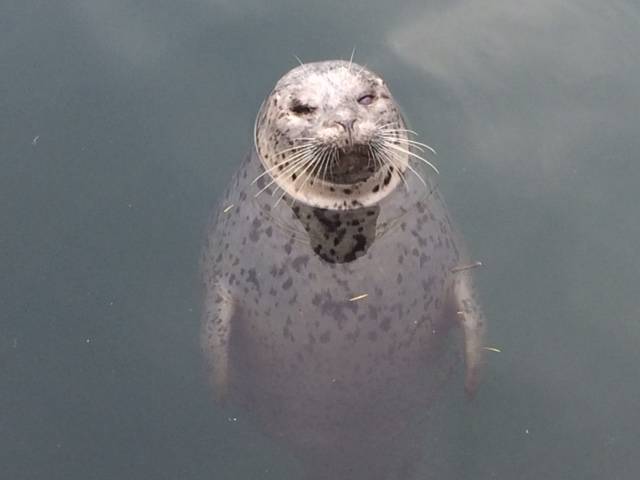By Jennifer Olson
Popeye the harbor seal, shown right, is a beloved member of the Friday Harbor community and we understand what a thrill it is to interact closely with a wild animal. However, a lot of people do not realize that marine mammals are protected under the Marine Mammal Protection Act of 1972. Feeding, touching or harassing them is illegal and may result in fines ranging up to $10,000 per infraction. Feeding wildlife changes their natural behavior and causes them to forage for food less. There can be serious impacts to their health if they are given contaminated food or food that is not part of their normal diet. A seal that is habituated to humans is also more likely to approach boats, which puts them at an increased risk of injuries from propeller strikes, entanglement, or ingestion of harmful fishing gear. Unfortunately, these bad habits can be passed along to their young or to other individuals in the population.
Feeding marine mammals can also be harmful to the humans feeding them. The Whale Museum’s San Juan County Marine Mammal Stranding Network has received multiple reports of people that were bitten by Popeye when they failed to let go of their food item in time. Marine Mammals carry many zoonotic diseases (i.e., diseases that can be transferred to humans) and injuries caused by these animals can lead to serious infections. Furthermore, an animal that is used to being fed by humans can get aggressive when it does not get what it wants. There have been a number of well-publicized cases of people being injured by marine mammals expecting handouts, the most recent example being a California sea lion that pulled a young girl into the water in Stevenson Harbor in May. Thankfully, the girl was not seriously injured; however, this is the type of dangerous situation that we would like to avoid in Friday Harbor.
Popeye has been a regular to the Port of Friday Harbor for many years. She is highly habituated to boats and people and is frequently sighted hanging out by the seafood shack waiting for handouts. However, it is highly unlikely that she is dependent on humans for food. A conditioned animal like Popeye may continue to exhibit changed foraging behaviors; however, it is crucial that we do not reinforce behaviors that put her and other seals at risk. The best chance for these animals to survive and thrive is to find their own food and not associate food with people. Help us protect Popeye and other marine mammals in our ecosystem! Learn more at nmfs.noaa.gov/pr/dontfeedorharass.htm. Report violations of to NOAA’s Office of Law Enforcement at 1-800-853-1964 and report all strandings or entanglements in the county to The Whale Museum at 1-800-562-8832.
Olson is the stranding coordinator at The Whale Museum.



